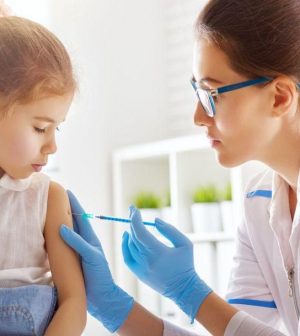- 10 Strategies to Overcome Insomnia
- Could Artificial Sweeteners Be Aging the Brain Faster?
- Techniques for Soothing Your Nervous System
- Does the Water in Your House Smell Funny? Here’s Why
- Can a Daily Dose of Apple Cider Vinegar Actually Aid Weight Loss?
- 6 Health Beverages That Can Actually Spike Your Blood Sugar
- Treatment Options for Social Anxiety Disorder
- Understanding the Connection Between Anxiety and Depression
- How Daily Prunes Can Influence Cholesterol and Inflammation
- When to Take B12 for Better Absorption and Energy
Nearly 900,000 U.S. Kids Under 12 Have Gotten Their First COVID Shot

About 900,000 U.S. children aged 5 to 11 received their initial dose of Pfizer’s coronavirus vaccine during the first week of eligibility for that age group, the Biden administration said Wednesday.
Not only that, nearly 700,000 more are scheduled in the coming days, health officials added.
The low-dose Pfizer vaccine for younger children was approved on Nov. 2 and the first doses were administered in some locations the next day, according to the Associated Press.
Nearly 20,000 pharmacies, clinics and doctors’ offices are giving the shots to children aged 5 to 11. About 28 million youngsters in that age group are eligible for the vaccine. Kids who get their first of two shots by the end of next week will be fully vaccinated by Christmas.
The White House is encouraging schools to host vaccine clinics to make it even easier for children to get vaccinated, and has also asked schools to share information from doctors, public health officials and other “trusted messengers” to counter misinformation about the vaccines.
Still, some experts say that demand could begin to recede in only a matter of weeks. They pointed to polling data that suggests only a fraction of parents plan to get their kids shots immediately, and they suspect the trend will mirror what happened when kids aged 12 to 15 were first authorized to get COVID-19 shots back in May, the AP reported.
In the first week after vaccines for that age group were approved, the number of adolescents getting a first shot jumped by roughly 900,000, according to an American Academy of Pediatrics analysis of federal data. The next week, it rose even further, to 1.6 million, the AP said.
“There was an initial burst,” said Shannon Stokley, of the U.S. Centers for Disease Control and Prevention. But the number dropped steadily for months, interrupted only briefly in early August as the Delta variant surged and parents were sending their kids back to classrooms, the AP reported.
Since then, adolescent vaccinations have dropped considerably, to just 32,000 getting their first shots last week. Only about half of adolescents aged 12 to 17 are fully vaccinated, compared to 70% of adults.
“We’re going to have a lot of work to do to communicate to parents about why it’s important to get children vaccinated,” said Stokley, acting deputy director of the CDC’s Immunization Services Division, the AP reported.
But there are compelling reasons for younger children to get vaccinated. Since the start of the pandemic, more than 2 million COVID-19 cases have been reported in U.S. children aged 5 to 11, and there have been 66 deaths in that age group over the past year, according to CDC data.
More information
Visit the U.S. Centers for Disease Control and Prevention for more on kids and COVID vaccines.
SOURCE: Associated Press
Source: HealthDay
Copyright © 2026 HealthDay. All rights reserved.










